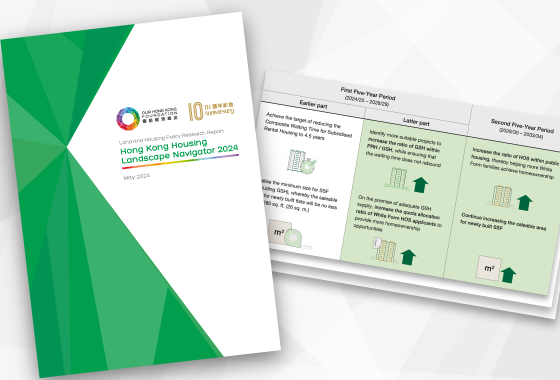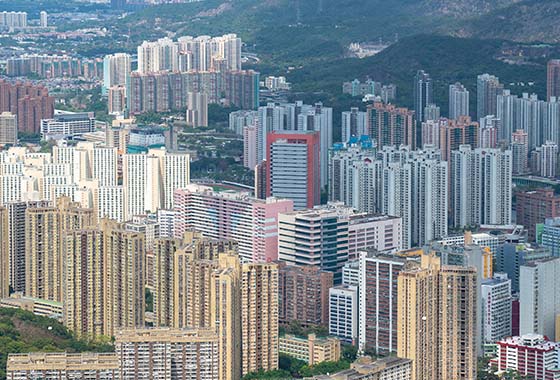Our Hong Kong Foundation Land and Housing Research Proposes Recommendations
to Implement the Subsidised Homeownership Scheme and to Accelerate Land Supply
Our Hong Kong Foundation (OHKF) releases its second public policy research report in the area of land and housing. The report recommends that the Government implement the “Subsidised Homeownership Scheme” (SHS) and change the existing mechanism determining the unpaid premium by fixing the amount at the time of purchase, so that households will no longer have to catch up with the ever-increasing property prices. OHKF believes that the proposed SHS would help grass-roots families purchase their own homes and in the long-term, improve social mobility, and alleviate income inequality and inter-generational poverty. Moreover, extending from the findings of the previous research entitled "From Housing Market Outlook to Land Supply Strategy" published in July, OHKF proposes that the Government should strive to establish a land reserve and to implement the Lantau Development as soon as possible, and calls for a greater societal cohesion and consensus to support land development.
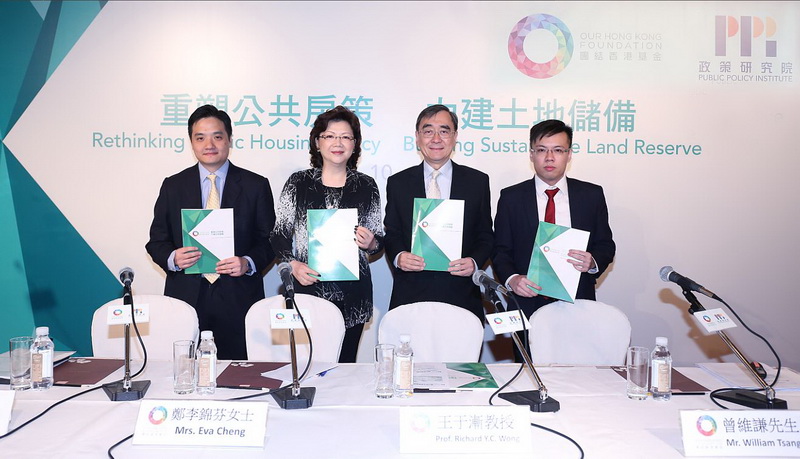
Professor Richard Yue-chim Wong, Professor of Economics at the University of Hong Kong and Advisor of OHKF; and Mr William Tsang, Senior Researcher at the Foundation (left to right).
The report points out that the prevailing mechanism of the Homeownership Scheme (HOS) and Tenant Purchase Scheme (TPS) require occupants to pay a market-adjusted premium at the time of resale of the unit at the open market. Over the years, the unpaid premium of HOS and TPS flats rose sharply alongside surging property prices, rendering it very difficult for families living in these units to save up sufficient capital to settle the unpaid premium, and in turn preventing them from becoming bona fide homeowners. Consequentially, this has widened the wealth gap between the “haves” and the “have-nots” in Hong Kong. This has aggravated the problem of income inequality, social mobility, and inter-generational poverty, which have produced social conflicts.
OHKF believes that the Government should provide more opportunities for public housing occupants to purchase their own homes. Therefore, it is proposed that public housing in the future should be geared towards homeownership, granting eligible families the option to rent, buy, or the choice to “rent first, purchase later” new public housing units. OHKF also recommends that the Government should change the policy on unpaid premium by fixing the premium value of the flat on the day of occupation, so that the occupants will not have to try and catch up with overwhelming and soaring property prices. This would make the said mechanism more reasonable.
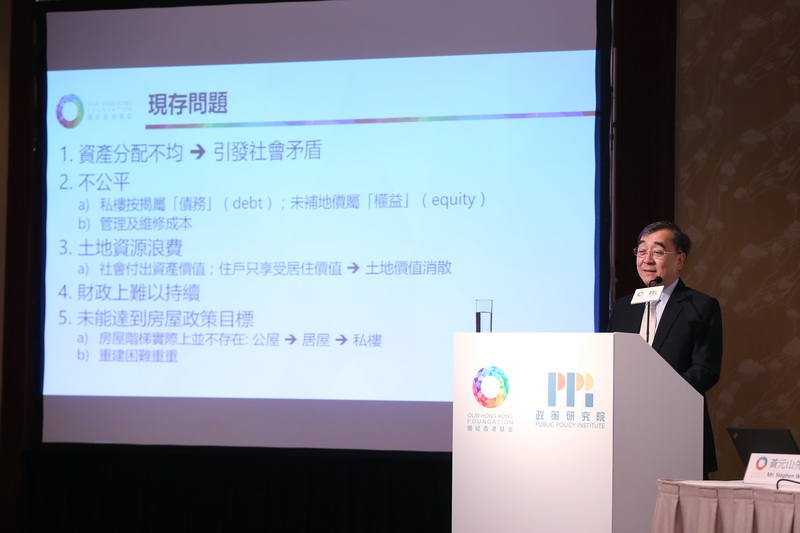
Professor Richard Yue-chim Wong, Professor of Economics at the University of Hong Kong and Advisor of OHKF, said, "The Subsidised Homeownership Scheme can achieve mutually beneficial outcomes for all. Firstly, with the release of land values and the creation of an active market in public sector housing, it can bring about economic benefits of up to HK$3 trillion, which is some 150% of Hong Kong’s GDP. Second, the sale of public housing will help the Government recover the construction costs and save on operating and maintenance expenses so that public resources could be used more effectively. Additionally, public housing tenants will have more opportunities to become homeowners, grass-roots families can own their properties just like private sector homeowners. Bona fide homeownership can serve different purposes, in the long run it can help alleviate the problem of income inequality and inter-generational poverty. If the Scheme is supported by the society, existing public housing estates can also be considered for the Scheme, starting with the privatisation of unsold TPS flats.”
In the meantime, OHKF indicates that there will be a critical undersupply of public housing units in the future. It is estimated that less than 100,000 public housing units will be completed in the next five years. This falls 30% short of the Government’s public housing supply target. In addition, supply and demand imbalances continue to exist among Grade A office buildings, commercial properties, and factory buildings, and the problem has even deteriorated further in the past year. After all, the problems mentioned above have stemmed from the lack of large-scale land development projects in Hong Kong, which has resulted in an acute shortage of land supply.
To increase land supply in Hong Kong, OHKF supports the implementation of large-scale land development projects such as New Development Areas (NDAs) in Kwu Tung North and Fanling North, Hung Shui Kiu and Kai Tak. OHKF also recommends that the Government set up a land reserve to ensure consistency and persistence in land supply strategy.
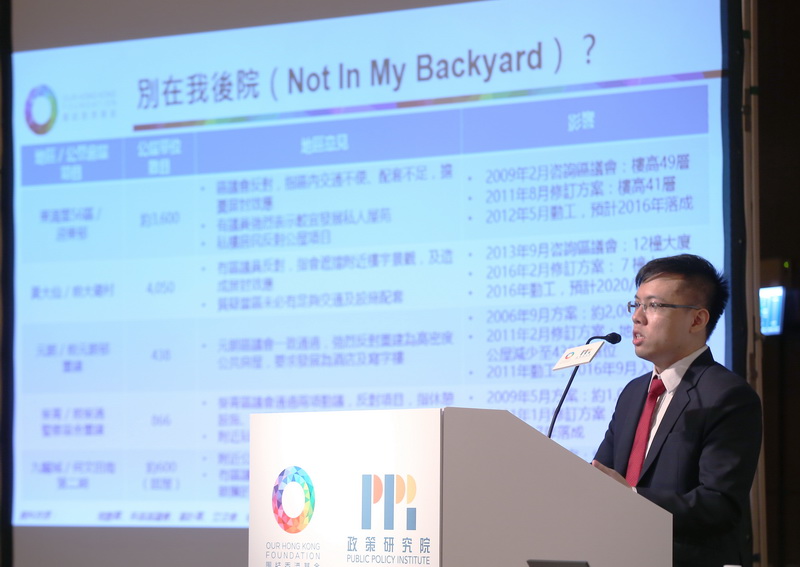
William Wai-him Tsang, Senior Researcher at OHKF, said, "Over the past decade or so, because of the lack of a land reserve, Hong Kong has paid the price for the inability to adjust land supply in response to market changes. For example, after the sharp drop in property prices from 1997 to 2003, the Government introduced a number of measures to stabilise property prices, including halting land sales, introducing the Application List System, and even suspending some large-scale land development projects. In fact, the development plans of several NDAs currently being implemented, including Hung Shui Kiu and Kai Tak, had been proposed during 1999 to 2001, and were shelved afterwards due to a lack of visionary planning. They were eventually re-tabled again after 2010. To avoid repeating the same mistake, the Government should strive to set up a land reserve. This can ensure that in the future the supply of land can be adjusted in response to changes in market demand.”
Hong Kong over the past decade has not seen any large-scale land development projects, and therefore the Government should strategically plan for our development needs. OHKF believes that Lantau Island is one of the most strategically important development projects in Hong Kong. OHKF recommends that the Government should consider linking up the major commercial and transport facilities such as the Hong Kong-Zhuhai-Macao Bridge, the Hong Kong Boundary Crossing Facilities Island, the Tuen Mun-Chek Lap Kok Link, AsiaWorld-Expo, and the North Commercial District of the Airport by using methods such as a light rail system. Furthermore, improving the transportation network of Tung Chung New Town and the future development of Siu Ho Wan will ensure that Lantau Island can fully realise its geographical advantage of being at the center of the Pearl River Delta region.
As land development takes time, it is particularly important to streamline the approval procedures for land development, and to make full use of existing land resources. OHKF recommends raising the development density of existing developable sites in the NDAs. The Government should also speed up the approval processes for land development by allocating sufficient fiscal resources and strengthening the use of information technology (such as an e-platform for approval of development plans) to enhance administrative efficiency.
Finally, land supply involves the interests of the society as a whole. OHKF believes that mere debates and arguments will not help improve the situation. Only by recognising the severity and urgency of the problem of land and housing shortages, and supporting speedier land development, can ensure that Hong Kong enjoys a sustainable future.


